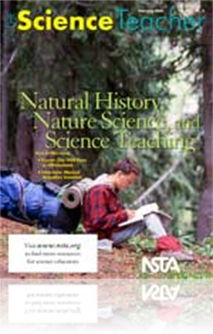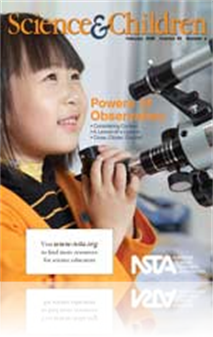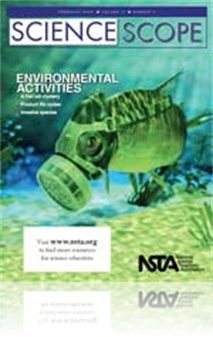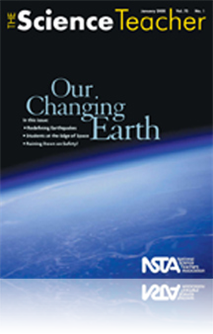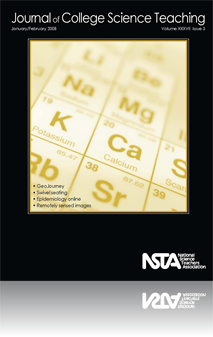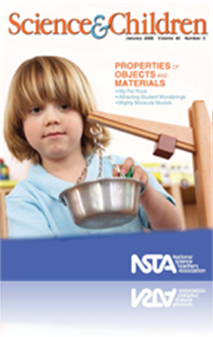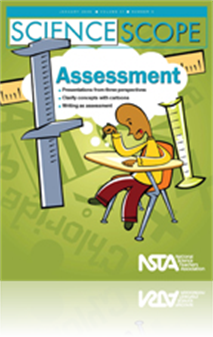All Resources
Journal Article
The Prepared Practitioner: Correlation and Causality
We are awash in data! Every week brings stories about scientific studies—especially those related to personal health. The news also brings stories about unscientific work that seems scientific, lending a veneer of importance to the work. Being scie...
Journal Article
Idea Bank: Knowing Without Seeing
In the following demonstration, students are asked to form a mental picture of an object hidden beneath a cardboard blind. Students must formulate hypotheses about the size, shape, and composition of the object while watching their teacher probe the ...
Journal Article
The “Under the Mistletoe” project was developed to capitalize on student curiosity about the American Christmas Mistletoe plant and draw learners into an engaging, inquiry-based exercise that incorporates numerous life science standards and colla...
Journal Article
Every Day Science: February 2008
This monthly feature contains facts and challenges for the science explorer. ...
Journal Article
Science Sampler: Using art to get kids into and doing science
In the following lessons, students learn about the biology of birds and conservation issues by bird watching at museums, zoos, and outside in the park or schoolyard. They communicate their understanding of concepts in biology such as structure and fu...
Journal Article
Field studies are an excellent way for students to learn ecological concepts and practice doing science. This article presents an approach for the secondary science classroom that permits students to ask and answer their own questions, a prerequisite...
Journal Article
Science Sampler: Alien Invaders! A board game about the threats posed by introduced species
Alien Invaders!—loosely modeled after the game of Life, helps students to understand how introduced species can affect native species. This board game allows students to role-play native birds in a world of introduced species, facing the hazards po...
Journal Article
Idea Bank: “Show-that”—A Better Framework for Problem Solving
“Show-that” problems provide the answer in the form of an equation in the question itself—which changes the goal from finding a number to showing the reasoning behind the answer. Is that not what problem solving should be about? The following ...
Journal Article
Many students do not have the manual dexterity to keep up with a fast-moving paramecium on a microscope slide. The lowly termite, however, provides an easily observable microscopic endo-ecosystem in an environment not usually considered by middle sch...
Journal Article
Because of the variability exhibited by individual animals’ responses to their environment, studying animal behavior can be a wonderful way to engage students in self-directed, open-inquiry investigations. Individual animals react in ways that are ...
Journal Article
As educators, we are always deciding what experiences we want to give students in order to achieve our goals of developing science process skills. One of the best ways of teaching about observation is described here. Using a hand lens and an illumina...
Journal Article
Career of the Month: An Interview with Musical Acoustics Scientist James Beauchamp
When we think of sound, several things come to mind, from irritating noises to our favorite songs. Musical acoustics is the scientific study of sound as it relates to music. Some musical acousticians research how instruments work and how they can be ...
Journal Article
Teaching Through Trade Books: Seeing Stars
The winter months are a great time to make observations of several familiar constellations. While there’s no scientific reason to “know” the constellations—they are simply imaginative pictures imposed on stars—studying constellations can he...
Journal Article
Safe Science: Raining Down on Safety!
Emergency eyewashes and showers are critical safety devices that are required in high school science laboratories. Unfortunately, some science teachers are putting themselves at risk in terms of liability and also compromising their students’ safet...
Journal Article
Unfortunately, in today’s world of politically motivated disinformation campaigns, our students may arrive at our classrooms already misinformed about science or highly skeptical of its message. It is our job as educators to act as guides on their ...
Journal Article
Investigating the Earth and Its Environment
Along with the need to make their curriculum more comprehensive and reflective of the national and state standards, one school district also searched for ways to make students more passionate about learning science. As a result, they developed a new ...
Journal Article
Properties are “hot,” not in terms of real estate but in science class. Here, the editor highlights the feature articles related to this month’s theme, Properties of Objects and Materials. With these articles as a guide, you can move students t...
Journal Article
This Isn’t English Class! Using Writing as an Assessment Tool in Science
We know that writing is a huge part of science. It is the way scientists communicate ideas, results, conclusions, and opinions to other scientists. Thus, the author uses writing in a number of ways to have students demonstrate knowledge and as an ass...
Journal Article
Many teachers and students have experienced the classic pet rock experiment in conjunction with a geology unit. A teacher has students bring in a “pet” rock found outside of school, and the students run geologic tests on the rock. The tests inclu...
Journal Article
Perspectives: Explaining Science
We often think of science as exploration and experiment. However, classrooms that portray only this view of science fail to capture an essential feature of science—evidence-based explanation. When scientists encounter patterns in the world, they co...
Journal Article
This article describes a twist on the basic “Science 101” investigation of having students observe a birthday candle before, during, and after burning. It engages students in exploring the attributes of a candle, introduces them to the concepts o...
Journal Article
Assessing Student Presentations From Three Perspectives
Analyzing student presentations from three perspectives—expert, peer, and self—provides extended feedback and opportunities to learn. All three of these are helpful and serve different purposes. The expert (teacher) feedback shows how the teacher...
Journal Article
Tried and True: Cell City WebQuest
WebQuests are online activities that require students to read, analyze, and synthesize information found on the web. To facilitate instruction and student inquiry, the WebQuest, Cell City, can be used to teach students the names and functions of all ...
Journal Article
Editor’s Roundtable: Monitoring and assessing student learning
An effective teacher never leaves a key part of a lesson without checking to make sure there is an appropriate level of mastery before moving on to the next lesson segment. Teachers must monitor and assess student learning and then adjust their instr...
Journal Article
Idea Bank: Convection in a Fish Tank
Understanding convection is fundamental for students to fully grasp the science behind large-scale events on Earth, such as global wind patterns, plate tectonic movement, ocean current patterns, and hydrothermal vent dynamics. Convection can also hel...
Journal Article
Science Sampler: Validating assessment—Teacher study groups
Teacher study groups are a valuable method of examining the validity of classroom assessments and determining how well the assessments align with student learning goals. The implementation of teacher study groups is based on a model from the Schools ...
Journal Article
Teaching Through Trade Books: A Closer Look
Give a child a hand lens or a microscope and they quickly become fascinated with the hidden worlds these tools reveal. The lessons in this month’s column provide opportunities for students to take a closer look at the properties of objects and orga...
Journal Article
Detecting Landscape Change: The View From Above
This article will demonstrate an approach for discovering and assessing local landscape change through the use of remotely sensed images. A brief introduction to remotely sensed imagery is followed by a discussion of relevant ways to introduce this t...
Journal Article
The experts address the following questions in this month’s column: What would a compass do on the Moon? and Where in our solar system can an object achieve the greatest terminal velocity? ...
Journal Article
Science Shorts: Stretched to the Limit
Children need to explore as many different materials as possible in order to make sense of their world. Understanding how materials behave in their natural state and under certain conditions will help them understand why objects are made of specific ...



